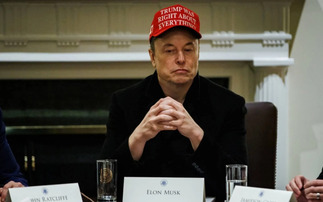If there is one issue that transcends all the different areas of modern journalism, then climate change is it.
It affects many parts of our lives, from our diets to the way we heat our homes to our choice of holiday destinations, and of course it is becoming a key consideration for investors too.
According to an independent study, commissioned by Clim8 Invest, climate change is the number one concern for 61% of UK consumers.
ESG Blog: World's largest companies failing to demonstrate human rights due diligence to investors
One tangible way to measure the positive contributions of investment portfolios on the climate is via reductions in carbon emissions and this is something moare and more providers are reporting today, while a growing number of investment products are aligning themselves with the Paris Agreement goals.
Reducing carbon emissions is also a key goal of the EU green recovery plan, which has pledged to devote nearly €550bn to green projects over the next seven years.
However, the European Commission has estimated that achieving the current 2030 climate and energy targets will require €260bn of additional annual investment, equal to about 1.5% of 2018 GDP.
Commenting on the challenge ahead, the European Commission said: "This flow of investment will need to be sustained over time. The magnitude of the investment challenge requires mobilising both the public and private sector."
Globally, the challenge is even greater of course, since Europe is in fact a leader when it comes to tackling climate change.
Worldwide, the OECD estimates that $6.9trn a year is required up to 2030 to meet climate and development objectives.
Taking action
To facilitate the transition, the private sector is already beginning to take action, with some of the largest firms leading the way.
For example, Microsoft recently announced an initiative to become carbon negative by 2030, while by 2050 it intends to remove from the environment all the carbon it has emitted either directly or by electrical consumption since it was founded in 1975.
In a blog outlining the firm's plans, president Brad Smith wrote: "We will fund this in part by expanding our internal carbon fee, in place since 2012 and increased last year, to start charging not only our direct emissions, but those from our supply and value chains.
"We are also launching an initiative to use Microsoft technology to help our suppliers and customers around the world reduce their own carbon footprints and a new $1bn climate innovation fund to accelerate the global development of carbon reduction, capture, and removal technologies.
"Beginning next year, we will also make carbon reduction an explicit aspect of our procurement processes for our supply chain. Our progress on all of these fronts will be published in a new annual Environmental Sustainability Report."
Meanwhile, some of the largest asset managers are also leading the way to a low-carbon future. An increasing number of them are taking the step to offset the carbon emissions of their business activities.
Standard Life Aberdeen is one such business. Sandy MacDonald, head of sustainability at SLA, said: "As you would expect our first step is to reduce our emissions as much as we can - and we have long-term targets in place to do this - and then we offset what remains.
"In partnership with ClimateCare, we are supporting an amazing accredited offsetting project based in the Gola rainforest of Sierra Leone over the next three years."
The offerings available to both consumers and business clients to do so are also increasing; Ecologi is a business that launched last year to allow individuals and businesses to fund climate projects, while impact investing app Tickr has just launched a new climate offsetting subscription for its customers.
Rigorous standards
Tom McGillycuddy, founder of Tickr, notes that the market for carbon offsets can be complex and therefore it is important to pick projects that are accredited in accordance with strict global standards.
Luckily, there are a number of organisations that ensure the carbon offsetting projects do indeed do what they say on the tin.
Rathbones' Harrison: Three factors to beat the index without using FAANGs
One such organisation is The Gold Standard, established by 2003 by WWF and a group of NGOs, whose aim it is to ensure projects adhere to the highest levels of environmental integrity and contribute to sustainable development.
Elliot Coad, founder of Ecologi, says: "They conduct an additional auditing and verification process to ensure no financial transaction ends up in the pocket of auditors and the monitoring keeps getting more rigorous.
"On a local level, Gold Standard also ensure the local community are the key stakeholders and there are a handful of other global goals each project must target that aren't just about climate action."
Ecologi has seen its number of climate positive members grow 34% during October alone, as climate action continues to move up the agendas of individuals and companies alike.
Coad says the firm's business client base now ranges from micro enterprises to agencies to law firms, and the number of larger clients continues growing.
Beyond personal
One of Ecologi's largest new clients is Cazenove, whose Charity Responsible Multi-Asset fund has recently begun offsetting the carbon footprint of the portfolio's equity investments via projects focused on biodiversity and reforestation.
It is one of the first asset managers to begin offsetting emissions for the investments within the portfolio as well as the business emissions. So far, Cazenove has reduces CO2 emissions by 855 tonnes and planted 5,030 trees as part of the project.
Kate Rogers, co-head of charities at Cazenove Capital said: "We are intentionally trying to reduce the carbon footprint of our portfolios in line with the Paris Agreement, but where we can't avoid carbon emissions, that' is what we are offsetting. The cost of offsetting is a cost to us and not the investors."
Rogers explained that Cazenove considers impact as a "third dimension of investment" on top of risk and return. It uses a proprietary tool, SustainEx, to report back to clients on the carbon footprint of the portfolio and the social dividend - the amount of social value their investments are having.
According to Vicky Lay, business development manager at ClimateCare, offsetting investment portfolio emissions is "the elephant in the room", as most companies offset Scope 1 and 2 emissions, but don't include Scope 3.
Scope 1 covers direct emissions from owned or controlled sources and Scope 2 includes indirect emissions from the generation of purchased electricity, steam, heating and cooling consumed by a company.
Scope 3, which includes all other indirect emissions that occur in a company's value chain, is arguably the most important to offset.
In fact, according to a study conducted by Nordea in 2018, 'greening' an individual's financial assets could generate 27 times greater improvement in his or her carbon footprint than any other measure, such as eating less meat, reducing water use or taking fewer flights.
Leading the way
However, so far, the trend of carbon offsetting investment emissions is more prevalent in the private equity space than it is in the listed equity fund market.
According to a survey conducted by Aberdeen Standard Investments (ASI), private equity firms are increasingly aware of climate change as an issue and many are responding with such actions as carbon offsetting.
An example of a private equity firm that is doing this is Triton Partners, which works with ClimateCare on a programme that prevents the release of around 300,000 tonnes of CO2 a year into the atmosphere.
Graeme Ardus, head of ESG at Triton, wrote in a blog: "On the environment side, we have a long-term strategy to decarbonise, but this takes time. We want to take responsibility for our emissions now. Alongside implementing strategies to reduce our footprint and move to renewable energy, carbon offsetting is an essential tool.
"It allows us to do something real and meaningful today. We take full responsibility for our carbon footprint, and that of our portfolio companies. Over time, as we continue to reduce our footprint, the requirement to offset will decrease."
The latter point is a very important one, according to Lay, who says "if the model works, the idea is that you need less offsets as you transition the economy [to net zero]".
She notes there is still a lot of capacity and work going on to expand the carbon offsets market to bring about the change needed to transition the world to a net-zero future, but "the onus is on corporates to develop bespoke projects and not just buy off-the-shelf solutions".
As such, financial institutions are in pole positions to help solve the climate crisis by providing the billions of euros needed for the carbon offset market to grow.
According to Ecologi, there are enough climate solutions out there right now to undo 30 years of carbon damage by avoiding 1,500 billion tonnes of CO2 if we supported them all.
And unlike some other areas of ESG, there are robust global standards already available, so it is easier to mobilise capital to go towards carbon offset project that really make a tangible difference.
















